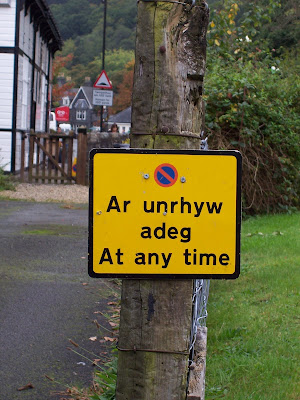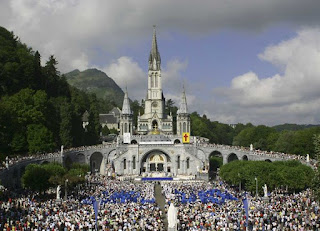 One of the fascinating aspects of my visit to Scotland last June was the reminder that English is not the only British language. The extraordinary little resort of "Tongue" on the far north coast was originally the Gaelic Tonga. The language is still spoken by over 60,000 people on the Scottish mainland and islands, where geographical isolation has helped to ward off the all-conquering English dominance. This was the depressing statistic cited in a recent "Scotland on Sunday" article, where specialists fretted that this "60,000" was the figure below which its long-time survival was unlikely. "Scotland on Sunday" pays lip service by having about a quarter of a page each week devoted to an article in Scots Gaelic. But it is otherwise as marginal a presence in the Scottish media as it is in the population.
One of the fascinating aspects of my visit to Scotland last June was the reminder that English is not the only British language. The extraordinary little resort of "Tongue" on the far north coast was originally the Gaelic Tonga. The language is still spoken by over 60,000 people on the Scottish mainland and islands, where geographical isolation has helped to ward off the all-conquering English dominance. This was the depressing statistic cited in a recent "Scotland on Sunday" article, where specialists fretted that this "60,000" was the figure below which its long-time survival was unlikely. "Scotland on Sunday" pays lip service by having about a quarter of a page each week devoted to an article in Scots Gaelic. But it is otherwise as marginal a presence in the Scottish media as it is in the population.The occasion for this gloom was the very expensive launch of a BBC channel dedicated to the Scottish Gaelic language (not to be confused with the Irish Gaelic, which Irish friends assure me is as different from its Scottish relation as German is from English). I wondered if this pessimism was justified. Minority languages hang on in the most unlikely and surprising corners of the world.
The example which surprised me most was the various dialects of Sorbian, a Slavic language spoken by small communities in Eastern Germany. Despite being immersed in the German speaking majority for centuries and persecuted or ignored under Nazi and Communist regimes, they have preserved their language and culture. Estimates of the number of Sorbian speakers vary from 45,000 to 60,000, close to that of Scottish Gaelic speakers. This seems to be a magic survival number, at least for the rational computerised models which predict the number of speakers, and the extinction of the Sorbian language at some point in the 21st century has been similarly forecast . But I would not bet on it.
 If you drive in the west of England and scan the radio waves, you may find an unusual text appearing on the radio display: "BBC CYMRU". Yes, you have hit the BBC Welsh channel, which caters for a much larger number of speakers than its Scottish counterpart. Cross the Severn Bridge into Wales and bilingual signs appear by the roadside. Go deep into Wales and you actually hear people speaking Welsh in the street.
If you drive in the west of England and scan the radio waves, you may find an unusual text appearing on the radio display: "BBC CYMRU". Yes, you have hit the BBC Welsh channel, which caters for a much larger number of speakers than its Scottish counterpart. Cross the Severn Bridge into Wales and bilingual signs appear by the roadside. Go deep into Wales and you actually hear people speaking Welsh in the street.You are very unlikely to hear it in the capital city of Cardiff, where Welshness is flaunted mainly by sticking a dragon on everything from the sides of buses to the postage stamps. But go to the wild and beautiful north and you hear young men out on their lunch break in small town centres in animated discussion in their native tongue (most likely of Rugby results). With 600,000 speakers, its survival looks mor assured than that of Scottish Gaelic.
I stopped at a farmhouse in North Wales for the night during a brief holiday in 1991 and my charming hostess served me tea and biscuits (cookies). The phone rang and she immediately switched to high speed Welsh talking to a friend. She took me upstairs to the bedroom, which was obviously the children's bedroom on other occasions. The brightly coloured spelling chart on the wall did not show "A for Apple" and "B for Bird". The Roman alphabet was taught using Welsh words.
In the 1970s I worked with a colleague whose second language was English. He had spoken only Welsh up to the age of seven. But then he was of an older generation, immediately before the all-conquering power of video and TVs in every child's bedroom showing multiple TV channels. The seductive attraction of this beautiful language was vividly illustrated in the recent film "The Edge of Love" about two of the women in the crowded love life of the poet Dylan Thomas. In one very telling scene Thomas and Vera, one of his old flames, sing a song in Welsh in front of her English husband. The bond of a common childhood language is something which the husband cannot share.
Many Welsh schools provide education in Welsh as well as English and universities still offer first and higher degrees. A friend has recently achieved first class honours in Welsh studies at Aberyswyth University.
Also there is official endorsement for Civil Service puposes. If you write to a Government department in Welsh, your letter should be answered in Welsh. After all, it is a much more ancient language than English. For a few years in the late 1980s and early 1990s I maintained the Department of Social Security's collection of standard letters - about 2,500 WordPerfect files covering all the major benefits - sickness, incapacity, widows pension, etc. One initiative which was proposed was to duplicate all these letters in Welsh. Two major problems were immediately obvious. One was finding enough skilled translators to turn all these documents into legally accurate Welsh. The second was how to shoehorn these extra 2,500 files onto the ancient PCs in local offices around the country. Even with the help of data compression software, their tiny hard drives were already bursting at the seams. Fortunately I moved on to other tasks and dumped my paperwork with my successor before we reached that impasse.
The Welsh, Scottish, Irish and Sorbian languages are all recipients of substantial amounts of public funds to assist their survival. There is good reason to doubt the effectiveness of public subsidy in the face of the overwhelming English linguistic imperialism. When even major European languages such as German and French are challenged on their home ground, it would be amazing if marginalised language groups could hold their own. One scathing Irish commentator described the results in the "Gaeltacht", the Gaelic-speaking western fringe of the Irish Republic, "We are spending millions to subsidise a Gaeltacht of rural slums where the everyday language is English, employment is unobtainable and a once proudly independent people have been corrupted into relying on public handouts". That was written well before the "Celtic tiger" revolution in the Irish economy transformed the prospects of people in the poverty-stricken west. But this financial transformation has had other utterly unpredicted results; the minority language you are most likely to hear in the west of Ireland these days is Polish. The regional centre of Limerick was grimly portrayed in "Angela's Ashes" as a place that dynamic young people of the 1940s and 50s were desperate to escape at any price - to England, Australia, America, wherever. Now it is invaded by dynamic young Poles to the extent that Polish shops, restaurants, banks and a medical centre have sprung up.
We are prepared to spend huge sums to conserve ancient buildings and works of art. A language embodies the essence of a living culture. Imagine if English disappeared as a living language and all the works of English literature could be appreciated only in translations and by a few eccentric academics studying dusty texts. It seems equally necessary to keep languages alive as to keep threatened species of animals in being; to have a living population of speakers rather than a mass of neglected textbooks and forgotten classics in the corner of a library.
At least one neglected language needs no public subsidy to keep it alive. At St William of
 York I go to the 900am Mass on Sunday. We cannot linger too long afterwards for coffee and conversation. The cups have to be washed and stored away because the Latin Mass Society (LMS) have arrived for their Mass at 1100am. A whole new wooden platform is quickly assembled in the sanctuary, so that the post-Vatican altar for Mass facing the people can be used for Mass where the celebrant has his back to the congregation. A sizable congregation turns up, some from as far as 20 miles away. Minivans carrying large families crowd the car park; even the parents are clearly too young to remember the Latin Mass as it was said up to the 1960s. You can hear the traditional Latin Mass in many parts of the country, but the next nearest venues would most likely be in Oxford 30 miles to the north or London 40 miles to the east.
York I go to the 900am Mass on Sunday. We cannot linger too long afterwards for coffee and conversation. The cups have to be washed and stored away because the Latin Mass Society (LMS) have arrived for their Mass at 1100am. A whole new wooden platform is quickly assembled in the sanctuary, so that the post-Vatican altar for Mass facing the people can be used for Mass where the celebrant has his back to the congregation. A sizable congregation turns up, some from as far as 20 miles away. Minivans carrying large families crowd the car park; even the parents are clearly too young to remember the Latin Mass as it was said up to the 1960s. You can hear the traditional Latin Mass in many parts of the country, but the next nearest venues would most likely be in Oxford 30 miles to the north or London 40 miles to the east.I say "hear" the Mass because for most of the service the congregation is silent and the priest alone recites the prayers. I have been to a couple of these Latin Masses and they are a striking reminder of what a recent innovation the dialogue Mass is. It is a 1950s innovation. For 19 centuries Mass was recited as the LMS arrange it today.
It is also a reminder of how recently the Church was so powerfully united by one language. Wherever you went in the world, it was as if the curse of Babel had been temporarily suspended, for at least one sacred hour. We could all share the same words without a translator. Like the first Pentecost, people from all over the known world could hear about the marvels of God, simultaneously, albeit not in their native languages.
 Go to Lourdes or some other major international religious site nowadays and you get a taste of linguistic bedlam. As if the major services at Lourdes were not long enough, you get some sections recited 4 or 5 times in French, English, Italian, Spanish and German - plus extra repeats if the Poles or Flemish-speaking Belgians (as opposed to French-speaking Belgians) are in town..... 50 years ago it was one united service which everyone could share spontaneously. It is a reminder of the tensions between the advantages of linguistic unity and preserving precious jewels from the margins of human genius.
Go to Lourdes or some other major international religious site nowadays and you get a taste of linguistic bedlam. As if the major services at Lourdes were not long enough, you get some sections recited 4 or 5 times in French, English, Italian, Spanish and German - plus extra repeats if the Poles or Flemish-speaking Belgians (as opposed to French-speaking Belgians) are in town..... 50 years ago it was one united service which everyone could share spontaneously. It is a reminder of the tensions between the advantages of linguistic unity and preserving precious jewels from the margins of human genius.

